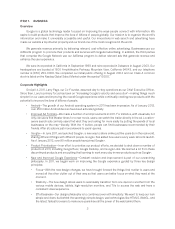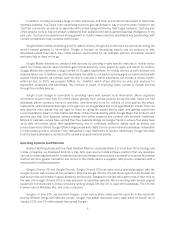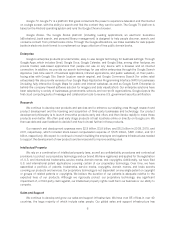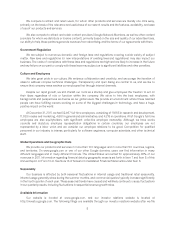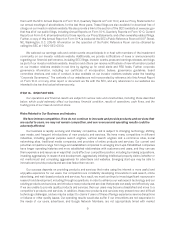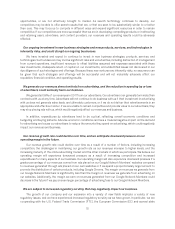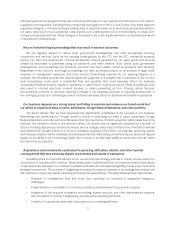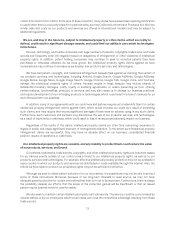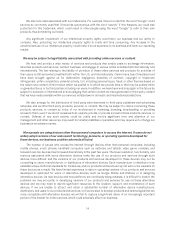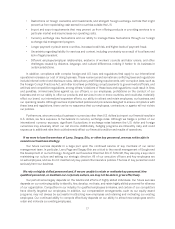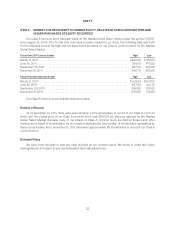Google 2011 Annual Report Download - page 41
Download and view the complete annual report
Please find page 41 of the 2011 Google annual report below. You can navigate through the pages in the report by either clicking on the pages listed below, or by using the keyword search tool below to find specific information within the annual report.• Failure to obtain required approvals from governmental authorities under competition and antitrust laws
on a timely basis, if it all, which could, among other things, delay or prevent us from completing a
transaction, or otherwise restrict our ability to realize the expected financial or strategic goals of an
acquisition.
• In the case of foreign acquisitions, the need to integrate operations across different cultures and
languages and to address the particular economic, currency, political, and regulatory risks associated with
specific countries.
• Failure to successfully further develop the acquired technology.
• Cultural challenges associated with integrating employees from the acquired company into our
organization, and retention of employees from the businesses we acquire.
• Liability for activities of the acquired company before the acquisition, including patent and trademark
infringement claims, violations of laws, commercial disputes, tax liabilities, and other known and unknown
liabilities.
• Litigation or other claims in connection with the acquired company, including claims from terminated
employees, customers, former stockholders, or other third parties.
Our failure to address these risks or other problems encountered in connection with our past or future
acquisitions and investments could cause us to fail to realize the anticipated benefits of such acquisitions or
investments, incur unanticipated liabilities, and harm our business generally.
Future acquisitions could also result in dilutive issuances of our equity securities, the incurrence of debt,
contingent liabilities, or amortization expenses, or write-offs of goodwill, any of which could harm our financial
condition. Also, the anticipated benefit of many of our acquisitions may not materialize.
A variety of new and existing U.S. and foreign laws could subject us to claims or otherwise harm our
business.
We are subject to numerous U.S. and foreign laws and regulations covering a wide variety of subject matters.
New laws and regulations (or new interpretations of existing laws and regulations) may also impact our business.
The costs of compliance with these laws and regulations are high and are likely to increase in the future. Any failure
on our part to comply with these laws and regulations can result in negative publicity and diversion of management
time and effort and may subject us to significant liabilities and other penalties.
Furthermore, many of these laws were adopted prior to the advent of the internet and related technologies
and, as a result, do not contemplate or address the unique issues of the internet and related technologies. The laws
that do reference the internet are being interpreted by the courts, but their applicability and scope remain
uncertain. For example, the laws relating to the liability of providers of online services are currently unsettled both
within the U.S. and abroad. Claims have also been, or may be, threatened and filed against us under both U.S. and
foreign laws for defamation, invasion of privacy and other tort claims, unlawful activity, patent, copyright and
trademark infringement, or other theories based on the nature and content of the materials searched and the ads
posted by our users, our products and services, or content generated by our users. Moreover, recent amendments
to U.S. patent laws will become effective in 2012 and may affect our ability to protect our innovations and defend
against claims of patent infringement.
In addition, the Digital Millennium Copyright Act has provisions that limit, but do not necessarily eliminate, our
liability for caching or hosting, or for listing or linking to, third-party websites that include materials that infringe
copyrights or other rights, so long as we comply with the statutory requirements of this act. Any future legislation
impacting these safe harbors may adversely impact us. Various U.S. and international laws restrict the distribution
of materials considered harmful to children and impose additional restrictions on the ability of online services to
12



